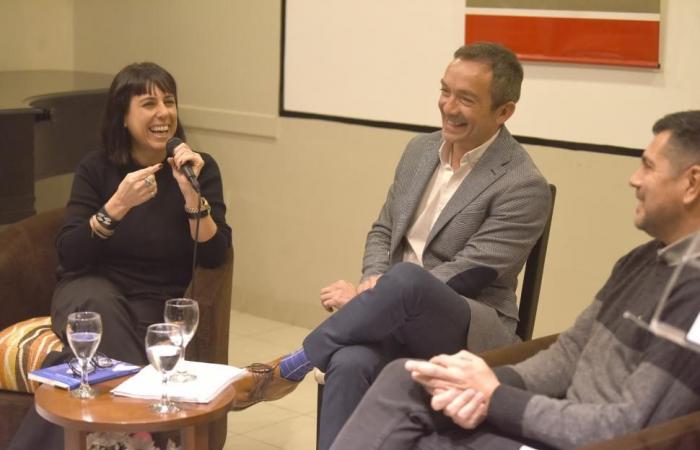María Lobo presented her new novel, edited by Tusquets. The Alliance Française and the Cartier Foundation awarded him the Jean Genet distinction
“An inexplicable corpse.” This is how he defines Hernan Sosa to the University City, that monument to unfinished projects so typical of the Tucumán that could not be. In “Ciudad, 1951”, the novel that Maria Wolf presented on Thursday, the University City is projected from San Javier with another perspective; rather as a series of memories of the future. “But not from nostalgia or controversy,” the writer emphasizes. Her book follows other paths and to analyze it, with the care that involved avoiding spoilers, was the mission during the meeting organized at the headquarters of the Alliance Française.
The cultural activity of Tucumán is nourished by its creators, but also by those who support them, celebrate them and entertain them with good taste. And in this range of hosts, the Alliance Française ranks high. Mariana Sawayaits director, highlighted Lobo’s career in the literary field and invited her to receive the Jean Genet award, intended – she explained – “for the contribution of our intellectuals.”
On behalf of the Alliance and the Emilio Cartier Foundation, the award was presented by the president of both entities, Eduardo
Posse Cuezzo. Lobo thus joined the group of outstanding personalities who have been recognized, within the framework of the celebrations for the centenary of the Alliance (which will end in August).
The protagonists made an effort to make the event more casual, finished off with empanadas, a toast with red wine, sweet snacks and some bars from the sax of Gonzalo Roldan. Lobo was accompanied on the panel Lucas Guzman (architect, professor at FAU-UNT) and, as noted, Hernán Sosa (PhD in Letters, professor and researcher at the University of Salta).
The novel “City, 1951” by María Lobo is presented
“It is a novel that I consider fundamental,” said Guzmán. Her bond with Lobo was woven in the Reading Club that she coordinated, a space of enjoyment – according to her story – enhanced by the conversations it fostered. Guzmán was struck by Lobo’s approach to his profession, shared by the protagonists of the story. “María understood the world of architecture and she made it her own,” she emphasized.
Sosa defined himself as a constant reader of Lobo and drew up a cartography of his work, guiding threads that reached “City, 1951.” Among the themes that the novel addresses, radiated from the extensive conversation held by the protagonist couple, Sosa mentioned aspects related to cultural politics: the desire to be modern (“there is no better excuse than the construction of a university city”), backwardness as a stigma of the “province”, the survival of one’s own (and its defense) and, of course, those memories of the future represented by “the nostalgia of what could not be.”
AWARDED. Mariana Sawaya, director of the French Alliance, with the writer from Tucumán.
Edited by Tusquets in its Andanzas collection, winner of the National Endowment for the Arts award, “Ciudad, 1951” follows “Los planes” (2016), “El interior fuera” (2018) and “San Miguel” (2022). In addition to these novels, Lobo published the volumes of short stories “Un pequeño militante del PO” (2014) and “Santiago” (2016).
Myth of Perseus
She chose to be brief during her intervention at the Alliance and rely on Italo Calvinoone of his favourite authors. He then read a fragment of a conference published in “Six proposals for the next millennium”, referring to the myth of Perseus. Lobo spoke about how to navigate reality and then pointed out: “you have to wear Medusa’s head and take it out when necessary. And when not, climb up into the clouds.”


